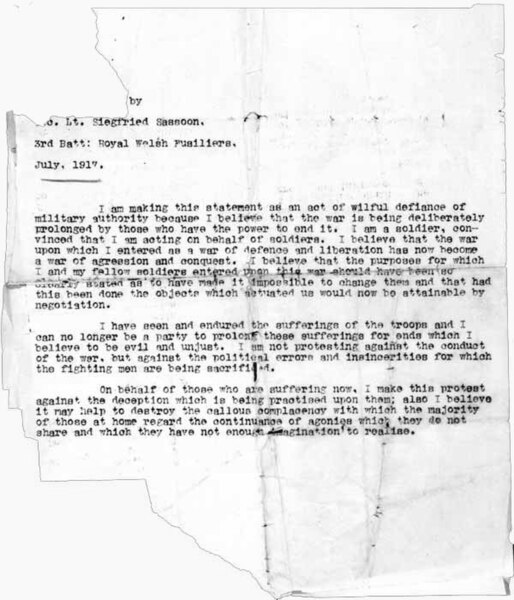 |
| Siegfried Sassoon, 1916. © National Portrait Gallery, London. Item NPG x 144195 |
Siegfried Sassoon (1886-1967) made a bold decision in the summer of 1917. As he records it in his Memoirs of an Infantry Officer, his recovery from a bullet wound received on the front after three long years of service allowed him time to formulate a statement of his feelings on the seemingly endless war. With the support of pacifist friends, he put pen to paper. Sassoon writes of this moment as one at which he reconsidered his relationship to the conflict, reclaiming his right, as an individual, to secede from the collective sentiments of patriotism or glory or duty that had encouraged so many to enlist and so many others to remain complacent about the events and costs of what was happening 'over there.' Here, from his memoirs, is that statement--an incredible declaration of individual feeling, agency, and integrity:
I am making this statement as an act of wilful defiance of military authority, because I believe that the War is being deliberately prolonged by those who have the power to end it. I am a soldier, convinced that I am acting on behalf of soldiers. I believe that this War, upon which I entered as a war of defence and liberation, has now become a war of aggression and conquest. I believe that the purposes for which I and my fellow soldiers entered upon this War should have been so clearly stated so as to have made it impossible to change them, and that, had this been done, the objects which actuated us would now be attainable by negotiation. I have seen and endured the sufferings of the troops, and I can no longer be a party to prolong the sufferings for ends which I believe to be evil and unjust. I am not protesting against the conduct of the War, but against the political errors and insincerities for which the fighting men are being sacrificed. On behalf of those who are suffering now I make this protest against the deception which is being practised on them; also I believe I may help to destroy the callous complacency with which the majority of those at home regard the continuance of agonies which they do not share, and which they have not sufficient imagination to realize.
Memoirs of an Infantry Officer, 207
 |
| "Finished with the War: A Soldier's Declaration." Sassoon's statement as read to the House of Commons and printed in the London Times. |
| The Hydra, 12th May 1917. © University of Oxford, First World War Poetry Digital Archive |
There is so much to read and learn about Sassoon and his incredible act of defiance. For those wishing to know more, Sassoon's memoirs are a good place to start. Pat Barker's trilogy of war novels, which begin with Regeneration, include a fictionalized account of Sassoon and Owen at Craiglockhart. An invaluable resource is also found in Oxford University's First World War Poetry Digital Archive, which contains multitudes--of documents, images, and other media related to personal histories of the war. The Peace Pledge Union Project, a British pacifist organization, also has an informative set of resources about Sassoon.
Take a moment to read Sassoon's statement and consider it both within and beyond its Great War framework. The words of this ghost of 1914 remain relevant and affecting. They devastate and inspire us with their insistence on the truths about national events or enterprises that are revealed through individual experience and testament.
© Fiona Robinson
Fascinating reading! Never more relevant than in our times.
ReplyDeleteI completely agree. Thanks for reading!
ReplyDelete